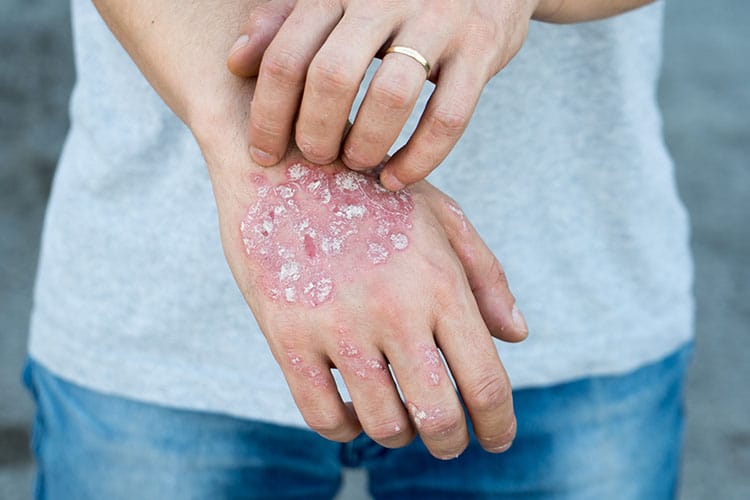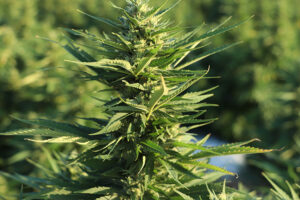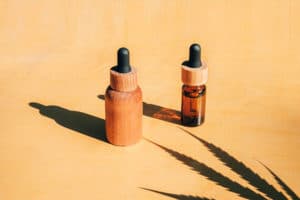While cannabis is commonly used as a recreational drug, it contains several compounds with proven medical properties. One of the most widely studied of these is cannabidiol or CBD. Studies into CBD have shown that it can treat epilepsy, reduce pain and inflammation, and potentially help with several other conditions.
See all CBD oil benefits here.
The upswing in interest in CBD and other cannabinoids means that many people have started claiming that CBD can cure almost anything, from infertility to cancer. One of the most common claims is that CBD can help cure psoriasis. But is this true, or is it just another baseless claim?
What is Psoriasis?
Psoriasis is a skin condition that causes skin cells to multiply faster than normal. This build-up of excess skin cells results in white scales and red patches, which are itchy and can cause social embarrassment. These plaques usually appear on the scalp, elbows, knees, and lower back, though in severe cases, they can grow and merge, covering large areas of the body. Psoriasis generally goes through cycles where it fades and then flares up again.
Nobody knows what causes psoriasis, though the most widely accepted hypothesis is that it’s an autoimmune disease in which the T-cells attack healthy skin cells by mistake. These overactive T-cells trigger increased production of healthy skin cells, which the T-cells attack again, leading to a cycle of overactive skin cell growth. Instead of taking weeks to move to the outmost layer of the epidermis, skin cells rise to the surface within days, causing the thick, scaly build-up of patches. This cycle can be triggered by any number of factors, including infections, skin injuries, stress, smoking, and certain medications.
The most common type of psoriasis is plaque psoriasis. It is characterized by thick, red patches of itchy skin covered in a white layer. Other, less common forms of psoriasis include:
- Guttate psoriasis – this type of psoriasis manifests as small red dots on the skin, often on the torso and limbs. The spots are not as thick as plaque psoriasis, though they may expand and develop into plaques over time.
- Inverse psoriasis – this type appears in the skin folds and is characterized by smooth red plaques.
- Pustular psoriasis – this is one of the most severe forms of the condition which manifests as many white pustules surrounded by red skin. The pus is not infectious, but the condition is extremely uncomfortable and can cause additional symptoms, including fever and chills.
- Erythrodermic psoriasis – this type of psoriasis shows up as large red scales that can cover most of the body. The skin starts to shed in large pieces, and an outbreak can have severe consequences on body temperature regulation.
What is CBD?
CBD, or cannabidiol, is one of many cannabinoids found in cannabis. Cannabinoids are interesting compounds because they bind to the human endocannabinoid system. This system of endocannabinoids and endocannabinoid receptors is responsible for modulating and maintaining many processes in the body. The two most widely studied functions of the endocannabinoid system are its effect on pain sensitivity and its effect on the human immune system, particularly the inflammation response. Since cannabinoids like CBD can interact with this system, they can also have an impact on both neurological functioning, pain management, and modulation of the immune response.
There are over 100 different cannabinoids found in cannabis, including CBD and THC. THC is probably the most well-known cannabinoid as it causes the high that is associated with smoking marijuana. It also has a dramatic impact on mood, perception, cognition, and motor function. Both THC and CBD affect the human endocannabinoid system, and, likely, they work synergistically to produce some of the medical effects that cannabis is known for. This synergistic effect has led to many studies using cannabis instead of CBD or THC exclusively.
The main way to manufacture CBD is to isolate it from plant extracts. The most commonly used plant extract is hemp extract, which contains much less THC than typical marijuana plants. CBD oil that is extracted from hemp contains only trace amounts of THC. This means that it won’t give you the high (or other mental side effects) of THC consumption.
There are two types of CBD oil sold on the market: isolate or full-spectrum. Full-spectrum CBD is less processed than isolate, so it will still contain the other cannabinoids and terpenes found in the original plant extract. Full-spectrum CBD gives you the benefit of the synergistic effect, though you run the risk of ingesting trace amounts of THC. Also, since it’s less processed, it can be difficult to know exactly how much CBD is in any given dose. This uncertainty can be problematic if you’re taking CBD to cure a particular ailment, and you want to be consistent in your dosing. Unlike full-spectrum products, CBD isolate products contain only CBD with no other compounds, so it’s easier to know how much CBD is in a dose, though you don’t get the synergistic effect.
Current Research
To date, there are very few studies that examine CBD for the treatment of psoriasis. However, there is a solid theoretical basis that cannabinoids could help treat psoriasis through several pathways. THC can mediate the inflammatory response into a non-inflammatory response by activating endocannabinoid receptors in the immune system. The endocannabinoid system also plays a role in controlling skin cell (keratinocyte) growth. Endocannabinoid receptor activation leads to decreased production of keratin K6, which is an indicator of keratinocyte proliferation. New research has shown that cannabinoids also inhibit keratinocyte proliferation without affecting the endocannabinoid system. All of these studies point to the same conclusion: CBD and other cannabinoids affect keratinocyte development and proliferation and could have an impact on the symptoms of psoriasis.
To date, there has been one small study that tried to link CBD with psoriasis treatment. The study looked at the effect of a product called Hemptouch (which contains CBD oil and several other plant extracts) on several inflammatory skin conditions, including psoriasis. The study consisted of 20 participants that used the skin cream on affected areas twice daily for three months. Five of these participants had psoriasis. The results showed a statistically significant improvement in skin elasticity and the Psoriasis Area and Severity Index for all five patients.
Unfortunately, the study had many drawbacks. These include the small sample size and the fact that the study didn’t have a control or placebo group. To obtain more conclusive findings, the study would have needed many more people from different ages, backgrounds, and ethnicities as well as either a negative control group or placebo group to examine the true effects of the skin cream.
Clinical trials are an essential component in confirming whether or not a particular treatment is effective. Clinical trials also look at many other treatment aspects, such as the dosage, method of delivery, and potential side effects. Doctors often rely on clinical trials to provide them with guidance on how to dispense medications. The FDA requires at least one thorough, convincing clinical study to approve a product for use.
What to Consider When Using CBD Oil for Psoriasis
While there is still little hard evidence for CBD oil as a potential treatment, you may still want to try it based on anecdotal evidence. As with any potential treatment, there are some steps you should take to ensure your safety throughout the process.
Speak to your doctor before using CBD oil. CBD, when ingested, can interfere with certain medications. Since your skin absorbs the CBD, you may get trace amounts in your bloodstream. Your doctor will be able to tell you whether it’s safe for you to use CBD oil or ointments.
Secondly, no matter what CBD product your try, use it on a small area first. Look for any signs of allergies or irritation before applying the ointment on larger areas of the body.
Do your research about the various products on the market. Avoid products with hemp seed oil, which contains very low amounts of CBD. Always check the label to see if the amount of CBD is listed. Avoid products that don’t supply this information.
There are many sellers out there that will sell products that don’t contain what they claim. All reputable sellers and brands will supply a certification of analysis, which shows that a product has been tested and verified by a third-party laboratory. If you don’t see a certificate, don’t be afraid to ask. If the seller is unwilling to provide one, move onto another brand or seller.
Conclusion
There is a lot of evidence pointing to the fact that CBD may be able to help with psoriasis. Not only does CBD inhibit the production of keratinocytes, but it also helps relieve pain and reduces inflammation. However, despite these promising initial results, there have been no formal, large-scale clinical trials conducted on CBD for psoriasis. As clinical trials provide information about doses, methods of delivery, side effects, as well as efficacy, many doctors are reluctant to prescribe CBD for skin conditions.
However, if you want to try CBD for your condition, speak to your physician about your plans and then approach your treatment with caution. There are many steps that you can take to reduce the risks and ensure the best possible results. Also, read up on your local laws regarding CBD and cannabis-related products and make sure to always buy from reputable sellers.
FAQs About CBD Oil for Psoriasis
Question: Can CBD oil help in treating Psoriasis?
Answer: To date, there are very few studies that examine CBD for the treatment of psoriasis. However, there is a solid theoretical basis that cannabinoids could help treat psoriasis through several pathways.
Question:What is Psoriasis?
Answer: Psoriasis is a skin condition that causes skin cells to multiply faster than normal. This build-up of excess skin cells results in white scales and red patches, which are itchy and can cause social embarrassment.
Question: What are the common forms of Psoriasis?
Answer: The common forms of Psoriasis are Guttate, Inverse, Pustular, and Erythrodermic.
Question: What to consider when using CBD oil for Psoriasis?
Answer: Speak to your doctor before using CBD oil. CBD, when ingested, can interfere with certain medications. Since your skin absorbs the CBD, you may get trace amounts in your bloodstream. Your doctor will be able to tell you whether it’s safe for you to use CBD oil or ointments.
Question: What should you avoid when using CBD oil as medication?
Answer: Avoid products with hemp seed oil, which contains very low amounts of CBD. Always check the label to see if the amount of CBD is listed. Avoid products that don’t supply this information.






